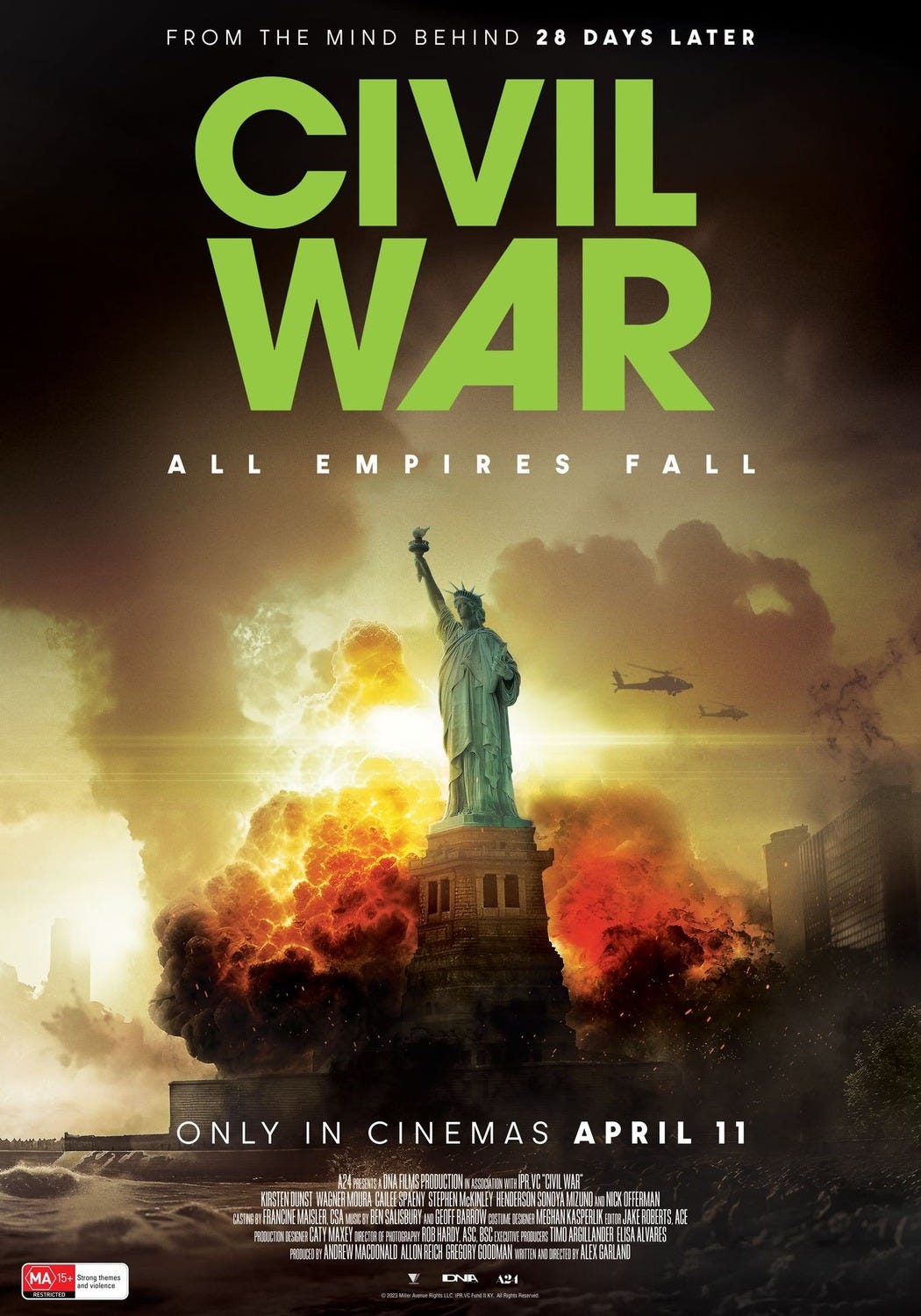Welcome to Point/Counter-Point! A series in which Heather and Tory duke it out over a movie or show they disagree on in short opinion pieces. Expect: plenty of exaggeration, sass, and punch!
Come for the drama, stay for the fun! And vote for who won this debate at the end of this post!
First Up: CIVIL WAR
Point: You need to see Civil War in theaters as soon as you can
by Tory
Civil War might not be the movie you want, but it’s the movie you need. This movie follows a group of photojournalists traveling from New York to D.C. during an American civil war in the not-so-distant future. We first meet Lee, a bigshot war photographer, and her colleague and good friend Joel, a writer. They’re on a mission to interview the President. They want to reveal the man behind the curtain.
The route to D.C. is treacherous - as Lee expected. This is where the movie shines. The visuals and sound are stunningly immersive. When they go through a war zone, we’re in a war zone too. When they’re in danger, when they’re afraid - we feel it too.
Along the way, they’re joined by Sammy, an older mentor figure, and Jessie, a rookie photographer determined to make a name for herself. Lee is less than enthused about the burdens of these new additions, but Joel is happy to have the company.
And while Lee, Joel, Sammy, and Jessie are all living this very real adventure, their primary role is: voyeur. It’s not their job to intervene in the war. It’s their job to watch, take photos, write. They don’t take sides. They don’t get involved when they see evil, destruction, and death. They just snap a photo - a good one, if they’re lucky. (Sound familiar?)
They know this work probably affects them. But they don’t dwell on that truth too much. And these characters are much like us, unaware of their vulnerabilities.
At one point, Jessie asks Lee if she would photograph her if she died. “What do you think?” asks Lee, matter-of-factly. Yes. The audience thinks. Lee has lost her humanity. Her body is just an extension of her camera.
But we learn that Lee, as hard as she presents, and indeed is, is still a human. She breaks down. She can crack a smile every now and then. And when she is tested, in the way that Jessie’s question demands, she proves who she truly is.
Most people who don’t like this movie are mad that it’s apolitical. What is the civil war about? (How are Texas and California on the same side?!) I’m sorry, my friends, but that’s not the point. And I love Kirsten Dunst as much as anyone, but you shouldn’t be looking to Torrance Shipman to solve our current geopolitical woes. This movie won’t give you an answer for things that are bigger than you and outside of your control.
What this movie does instead, is ask you a question: Who are you in the midst of this chaos? Maybe you’re like Lee, and you’ve already been through it. You're tired and discouraged. Or maybe you’re like Jessie, basing your identity on untested ideals. Either way, the question is the same.
This movie won’t give you the answers you want, but it asks the question we’re afraid to ask ourselves.
Counter Point: Civil War isn’t worth the $15 cinema ticket, not during these hard economic times
by Heather
Look, I am all for supporting the film industry by patronizing your local theaters. And I’m all for a big screen experience, especially for big movies like Dune and Civil War. But sadly, as occasionally fun or thrilling as it was to see these films with surround-sound, both left me walking away, wanting more.
I don’t disagree with Tory that Civil War has its cinematic wow-factors. The soundtrack had me tapping my foot, and when I drove back home on the highway later, I felt like I was on the road with those adrenaline junkie journalists, late summer sun lighting up the tops of the trees, wind in my hair… Who doesn’t love some good road trip scenes?
Okay, so that’s the way the movie made me feel. At least, the parts that didn’t have Americans committing horrendous crimes against each other. While I agree with Tory that we don’t necessarily need a Red vs. Blue explanation of what’s going on here, I still wanted the filmmaker to put forward a little more of a premise than: journalists are heroic unbiased history-keepers.
Because we all know that isn’t true. And as one critic put it, simply by taking the photo – by framing and capturing that which you think is important – you are biasing the moment. In this case, what the journalists frame through their lenses doesn’t tell a cohesive story. At the end of the day, that’s what I want.
I liked Lee and her wisened visage. I even liked Jessie and her plucky, sometimes annoying, and also at one point fatal, impulsivity. I like their little story, how their characters and histories inter-played throughout the film. But that little story took place in the context of a massive Civil War on American soil and you know what? That story, in my humble opinion, is the far more interesting one. It’s the one we want. It’s the one we deserve. I wish Alex Garland had told it.







